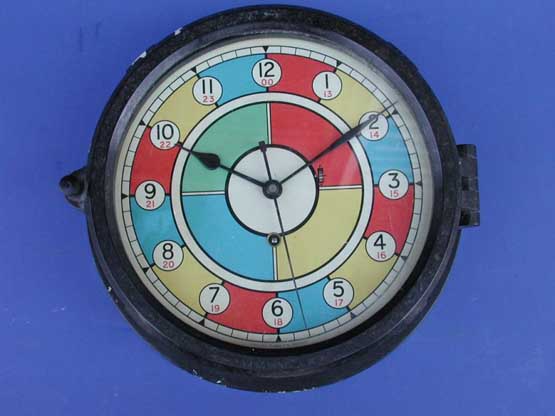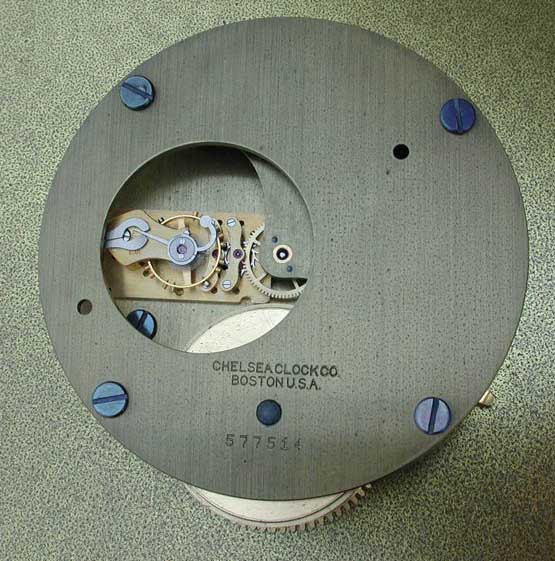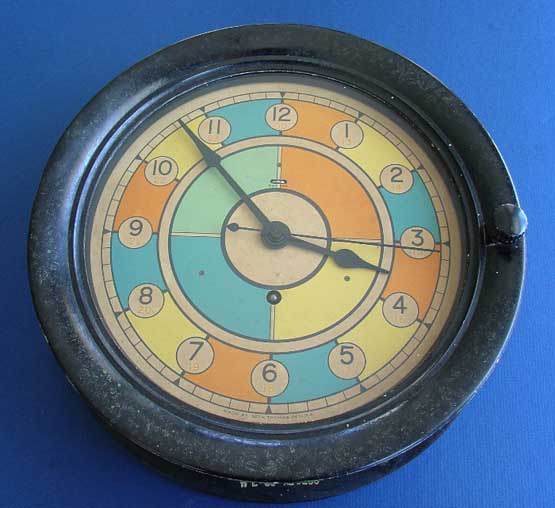
| WWT Shows | CLICK TO: Join and Support Internet Horology Club 185™ | IHC185™ Forums |

|
• Check Out Our... • • TWO Book Offer! • |
Welcome Aboard IHC185™  Internet Horology Club 185
Internet Horology Club 185  IHC185™ Discussion Site Main Page
IHC185™ Discussion Site Main Page  Horological Discussions, Questions and Answers
Horological Discussions, Questions and Answers  Military Timepiece Discussions - EXCLUSIVE!
Military Timepiece Discussions - EXCLUSIVE!  Colored Chelsea Clock Dial Identification Needed
Colored Chelsea Clock Dial Identification Needed
 Internet Horology Club 185
Internet Horology Club 185  IHC185™ Discussion Site Main Page
IHC185™ Discussion Site Main Page  Horological Discussions, Questions and Answers
Horological Discussions, Questions and Answers  Military Timepiece Discussions - EXCLUSIVE!
Military Timepiece Discussions - EXCLUSIVE!  Colored Chelsea Clock Dial Identification Needed
Colored Chelsea Clock Dial Identification NeededPage 1 2
Go  | New Topic  | Find-Or-Search  | Notify  | Tools  | Reply to Post  |  |
| IHC Member 456 |
Can anyone shed some light on this Chelsea clock dial? I don't even see it in Marvin Whitney's Military Timepieces book. Where was it used? What do the markings/colors mean? Thanks for any info! Mike  | ||
|
| IHC Member 456 |
The movement serial number is 577,514 which dates to around 1952 from what I can find out.  | |||
|
| Life Achievement Military Expert |
With all those colors, it's either a special military clock or it's from PeeWee's Playhouse. Seriously, I have seen dials like this one before, but I can't recall what this type of dial was used for. The serial number would place it in the 1950 to 1954 range. More information will be posted as it is found. Best regards, Greg | |||
|
It is interesting but I don't see any of the usual markings that point to it being a military clock. Are there any inside of it? Perhaps it is from an early version of Twister? | ||||
|
| IHC Member 456 |
Jim, that's a good point that it may not be a military clock...I just assumed that it was, since all the ones I have seen in a case like this were military marked. Maybe Greg could move this thread to the non-military clock thread or put a link to it? | |||
|
Wait! Definitely a military clock! It is usually referred to as a signal room clock. The intent, as I understand it, was so that an event might be announced as "half past blue/red". A very minor leagues code but, a really fun clock.I've had one . I phoned my militariana dealer pal to confirm this.He has had them too and concurs on the usage. -Cort | ||||
|
I'm not sure I understand that code. The blue, red, yellow outer sections are not associated with any hours - they are between the hours. For example, if you were to want to say half past 10, would you say half-past red or half past yellow? Also, the inner sections do not correspond either. And while it could be a military clock, why are there none of the usual plethora of markings on it that all other military clocks (and other instruments) always have? Such markings are used to ensure small valuable things did not walk out the door, to enable correct replacement parts to be ordered from military supply centers, to provide accountability for procurements, to distinguish between different models ordered under different contracts, etc. etc. I am saying it is or is not a military clock, it is just that it is not making sense to me yet as being one. Could you ask your militaria friend to see if he has a procurement contract number or a model number or something like that for this kind of clock? | ||||
|
Hi there, i am sure i have seen this clock somewhere before... it looks color coded to me, the inner circle 4 colors are the first level, the second circle sectors are the second code, naming two colors you have 12 combinations...wasnt it used together with a mapping table in the RAF operational room in WW2? rgds Enzo | ||||
|
Jim, Good point. To be clear, I am reporting what I think I know, not what I..etc. Mercifully, the combination of blue/red does exist on the clock (I randomly thought of it as an example). I would interpret "blue/red" as representing a time between 6 and 7 0'clock. 6:30 would have been my first guess regarding the time. AM/PM would not be factored in to this. So... I still believe this is a military item and I will try to get a better description of it's use. -Cort -reporting from Newton,Ma.. I was in Sudbury and Waltham today | ||||
|
Good point, Cort. That explains it in part, but then how would one refer to a time such as 0600 or 1500 where the four interior quadrants and the twelve outer sections have seams and where no colors are? And how would one differentiate between say 0600 and 1800? Also, I wonder why this would be such a simplistic code when just a few years earlier the U.S. and British military cypher experts were decrypting such complicated codes as the German Enigma or the Japanese naval codes? I am still confused and wanting to know more. | ||||
|
hi Jim, I can't claim any direct knowledge here but, I'll take a stab at answering your questions anyway. You are, of course, correct that there is no difference between "0600 and 1800". I guess they expect you know night from day. Don't forget that "ship's bells" are repeated six times each day. O600 would be blue/red and O500 would be yellow/red. That seems uncomplicated (or did I miss something?). The "blank"bars may be an attempt to more obviously demarcate where the quarter dial points are. Your last point about the simplicity of the "code"is a good one. I can only guess, but, instead of code, perhaps it was a military attempt to be clear and distinct? For example, they don't say "C", they say "Charlie", right? Each hour mark on the clock has a second number within it's cartouche. Number "5" has a "17" below, presumeably for "seventeen hundred hours". As to the date of this clock, I would check the serial number list for a "ballpark" date. I haven't, but I'd bet it's older that the 60's. -Cort | ||||
|
Michael, who posted the photos, said the serial number dates it to 1952. The blue/red designation you suggest for 0600 or 1800 doesn't make sense to me since that is using two outer ring colors rather than the one inner plus one outer ring color. Also, if one were to use the two outer ring colors then the blue/red code would be repeated for 0300, 0600, 0900, 1200, 1500, 1800, 2100, and 2400. It would also be confused with the one inner plus one outer ring designation for the times from 0601 through 0659 and 1801 through 1859. I suppose one could add the word "red" at the end of a code to designate afternoon/evening hours since 13 to 00 are in red ink in the white circles. Also, one could use two inner ring colors with two outer ring colors to designate exact hours, but then one would wind up with a pretty unwieldy code for a time such as 1800 by having to say yellow blue blue red red. Also, it creates endless possibilities for confusion when the whole point is to be clear. One additional puzzlement that came to me last night when I was thinking about this is what happens when a person is colorblind? Color blindness affects mainly men. I just took a quick look at wikipedia and it says there that it affects 7 to 8 percent of the male population. Would it be a good idea to have a code system where that many soldiers would not be able to make use of it? It is an interesting question. | ||||
|
Hello All, Colour Blindness shouldn't really be a factor, When I was in the Army everyone was tested for Colour Definition (Blindness) and Those that failed were given positions or jobs that would not be affected by this defect. "Signals" (Radio) operatives etc were tested with Multi-Coloured Wiring Looms as well as the standard test cards. Regards, Ged. PS I can't work out what the Clock Use was, and without Military Markings,????? | ||||
|
| IHC Life Member |
Hello I agree with Ged that military personnel were very carefully tested for color blindness depending upon the position they were applying for. I was in the electronics field and color was very important. Maybe everyone is missing the white center on this clock. If one were to say white,red,blue it could mean 0200 to 0300. If they just said red,blue it could mean 1400 to 1500. In this manner you may denote any one hour period desired. This is just a thought on my part. Doug | |||
|
| Life Achievement Military Expert |
Research to date: So far, I have started posts regarding this clock dial on our regular clock forum, the Broadarrow.net forum, and even the German Military watch forum. But no luck. Yesterday, I contacted the Chelsea Clock Co. Although they are familure with these dials on old clocks returned for repair, no one at Chelsea knows what the dials were originally intended for. Best regards, Greg | |||
|
I'm a bit surprised these clocks are so confounding. I remembered another one that sold at our chap.5 silent auction, maybe 10 years ago, that was mounted in a wooden (oak?)transport box. When opened, the clock displayed upright in the lid.I remember being annoyed because I thought it sold too cheap. The issue of the purpose of this clock is starting to annoy me. I will extend my antennae and try to pick up some more info.There is a Chelsea expert in the De Anza chapter who I will check with. I think this question can and should be solved. It surprises me that the Chelsea archivist knows the clock but can't explain it. -Cort | ||||
|
| Life Achievement Military Expert |
Cort, you have provided an interesting clue. The wooden box you described sounds like the type used with the U.S.Army Message Center Clocks. I don't have any information about wooden boxes of this type being used for any other purpose. On the other hand, known Chelsea message center clocks are usually marked with the movement caliber (12E) followed by the date of production, which is stamped into the back plate. The above movement does not have these markings. Which may or may not be significant. Best regards, Greg | |||
|
Hi Cort. I know that auction was ten years ago, but do you have any recollection as to whether the box in which it was sitting had a data plate or some kind of markings? | ||||
|
Chelsea Clock Company can also provide you with the sales information which may provide a clue as to it's use. For example, I have a Chelsea Clock that was recorded as shipped to the U.S. Marine Corps on the date of the new fiscal year (back then) of June 30 1942. So I know it had military application. Since your case appears to be manufactured with Bakelite material to save on valuable brass, it indicates WWII era. | ||||
|
Reminds me of a RAF sector clock. The colouring is military used. 
Tim | ||||
|
Ok, I found a Seth Thomas version of the same style clock. It's refered to as a "sector clock". Now we know that it is not a homemade model. Now the question is what was it used for. The colored sectors match the RAF version above provided by Timothy.  | ||||
|
Nancy Dyer found the answer and briefly pointed it out to me. The answer is similar to given above. In a war room, you wanted to keep track of where boats or planes were and show their position on a big map table. Boats or planes would report in (or be sighted in the case of enemy planes). The time of the report would be color coded according to the clock. A small model of the boat or plane would be placed on the map with a color coded flag indicating the time of the report. Planes move much faster than boats. All you need for a plane is 10 minutes of codes. Anything beyond that is old news. Boats move slower, so you need a longer lasting color code. So you use two colors to represent up to an hour. I may be a little off on this, but that was the general idea. Take a look at this http://home.earthlink.net/~modguide/opsroom.html and http://www.winkton.net/RAF%20S...0pages/sopleyww2.htm Don | ||||
|
| Powered by Social Strata | Page 1 2 |
| Your request is being processed... |
|
Welcome Aboard IHC185™  Internet Horology Club 185
Internet Horology Club 185  IHC185™ Discussion Site Main Page
IHC185™ Discussion Site Main Page  Horological Discussions, Questions and Answers
Horological Discussions, Questions and Answers  Military Timepiece Discussions - EXCLUSIVE!
Military Timepiece Discussions - EXCLUSIVE!  Colored Chelsea Clock Dial Identification Needed
Colored Chelsea Clock Dial Identification Needed
 Internet Horology Club 185
Internet Horology Club 185  IHC185™ Discussion Site Main Page
IHC185™ Discussion Site Main Page  Horological Discussions, Questions and Answers
Horological Discussions, Questions and Answers  Military Timepiece Discussions - EXCLUSIVE!
Military Timepiece Discussions - EXCLUSIVE!  Colored Chelsea Clock Dial Identification Needed
Colored Chelsea Clock Dial Identification Needed©2002-2025 Internet Horology Club 185™ - Lindell V. Riddle President - All Rights Reserved Worldwide

